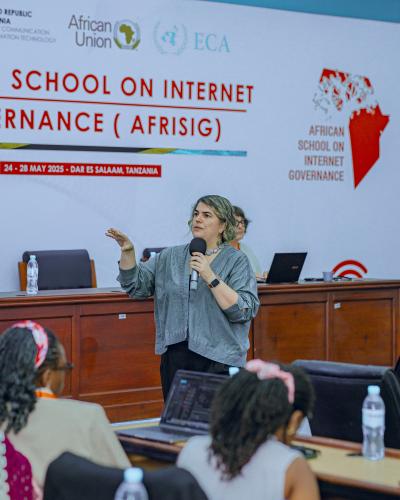
When I landed in Dar es Salaam in the United Republic of Tanzania) for this year’s African School on Internet Governance (AfriSIG), I was greeted by more than just the humid ocean breeze – there was an immediate sense of warmth that permeated every interaction. From the shuttle driver who patiently showed us places of interest as we drove to the Southern Sun Dar es Salaam, a long-standing hotel deeply invested in the city’s hospitality sector – having been officially opened by President Benjamin Mkapa himself – to fellow participants who shared stories of their home towns over five days of indulging in traditional food, from cassava to goat meat, I felt at home before the first session even began.
Yet nothing felt more like home than the Human Rights and Digital Rights segment, ably presented by Paula Martins of the Association for Progressive Communications (APC) at AfriSIG 2025. As a lawyer completing my PhD in child digital rights, I am used to reading densely-worded treatises late into the night, but Paula’s session reframed everything. She invited us to see human rights not as static legal entitlements, but as living struggles for dignity and justice, constantly shaped by local culture and community.
She touched upon “all human rights that exist offline must also be protected online”, which deeply resonated with me with as a child digital rights expert. In that moment, I felt the full weight of my work: children aren’t just users or data points; they are rights-holders whose online experiences, privacy, access and expression matter just as much as their offline lives. Hearing her quote Abdullahi An-Na’im on rights gaining legitimacy through political engagement reminded me why I chose this path: real change happens in communities, not only in courtrooms.
Throughout AfriSIG, Tanzanians showed me how hospitality fuels collaboration, I paused mid-supper to marvel at how easily strangers become friends here. The rice was so delicious; and when I complemented the chef, I was offered some to take home, as we debated policy responses to internet shutdowns and algorithmic bias. That simple gesture – sharing rice, a gift of African cuisine – while sharing ideas echoed Paula’s closing reflection: “Human rights make sense when we can find them on the streets, when we connect to the internet, in our communities, and not only on paper.”
By the end of the week, I had gained new theoretical frameworks and inspiring quotes – from Makau Mutua’s challenge to dismantle structures of exclusion to Boaventura de Sousa Santos’s call to ground rights in the struggles of the marginalised. But that wasn’t all: I had also built a network of colleagues across Africa who reminded me that legal texts come to life only through human connection.
To Paula who triggered this thought process, the AfriSIG facilitators and every warm-hearted Tanzanian I met, thank you for showing me that digital rights are woven into the very fabric of everyday life. I leave Dar es Salaam more determined than ever to ensure that, online as much as offline, every child’s right to privacy, education and expression is honoured.
Belinda Matore is a human rights practitioner and researcher with experience working within the African human rights system, with particular focus on digital rights and children’s rights in the digital age. She currently serves as a project officer at the Centre for Human Rights, University of Pretoria, where she works on initiatives that promote human rights in the context of technology, law and policy across the continent.
The 13th annual African School on Internet Governance (AfriSIG) took place from 23 to 28 May 2025 in Dar es Salaam, United Republic of Tanzania, and was convened by the Association for Progressive Communications (APC), the African Union Commission’s Information Society Division, and Research ICT Africa (RIA), in collaboration with UNECA and the UN IGF Parliamentary Track.
